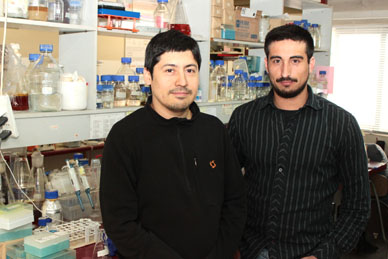- Dr. Renato Chávez and biochemists Luis Figueroa and Javiera Norambuena were honored at the 5th Congress of European Microbiologists, in Leipzig (Germany) for their research on bioactive compounds from Antarctic marine sponges, which present a high microbial, antitumor and antioxidant activity.
The study’s innovation and impact and the results shown were the reasons for giving the Best Poster Presentation Award to the study conducted by a team of researchers from Universidad de Santiago and Universidad de Chile in one of the most important events worldwide in the field of Microbiology: the Federation of European Microbiological Societies Congress, FEMS 2013.
The research team is composed of Dr. Renato Chávez, researcher from the Faculty of Chemistry and Biology, Universidad de Santiago, and the biochemists Luis Figueroa and Javiera Norambuena, also from Universidad de Santiago, together with other specialists from Universidad de Chile. They conducted the study for three years.
The study is based on the analysis of new bioactive compounds, present in filamentous fungi of Antarctic marine sponges. These compounds show a high microbial, antitumor and antioxidant activity.
Discovering these new species and their properties, supported by the required laboratory research, could lead to potential applications in Biotechnology, especially in the field of Pharmacology.
Regarding the study’s development, biochemist Javiera Norambuena says that, in order to find these bioactive compounds, it was necessary to search poorly explored places, as in those places there are more possibilities of finding non-cultured organisms. “That is the reason why we isolated fungi from Antarctic marine sponges, which usually have chemical compounds containing secondary metabolites; that is to say, they are not required for the organism’s survival, but they give it advantages over other members of the population”, she adds.
Regarding the study’s results, biochemist Luis Figueroa notes, “a high percentage of the isolated fungi could not be identified, which suggested the existence of new genera in the microbial community from Antarctic marine sponges; therefore, we can conclude that the fungi community in the Antarctic marine sponges studied is completely different from the one in common marine sponges.”
“We are on the right track”
Dr. Renato Chávez, researcher and professor of Faculty of Chemistry and Biology, says, “The honor awarded confirms that our work with fungi from Antarctic sponges is of international interest.”
“The award confirms that regarding the study of Antarctic marine eukaryotes (fungi and yeasts), we are on the right track, what encourages us to continue in this line. We are aware that we are dealing with new species that have not been described yet, so describing them is among our next goals. Also, we know that these species produce chemicals with very interesting properties that could be used in the Biotechnology field. As for the students participating, this award is most certainly an incentive for them as young researchers,” Dr. Chávez adds.
The full research team that took part in the poster presentation is made up by undergraduate and graduate students from Faculty of Sciences, Universidad de Chile: Marlene Henríquez, Ivanna Araya, Andrea Beiza and Karen Vergara, while the work presented at the Congress is supported by Fondecyt Project 11090192, conducted by Dr. Inmaculada Vaca, from Universidad de Chile.
Translated by Marcela Contreras



